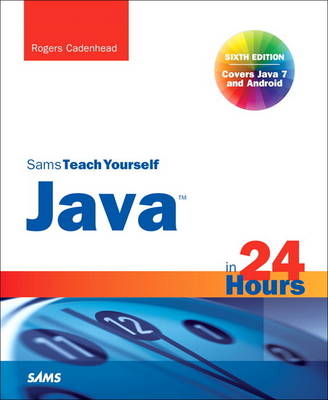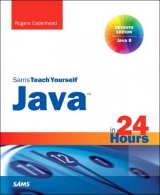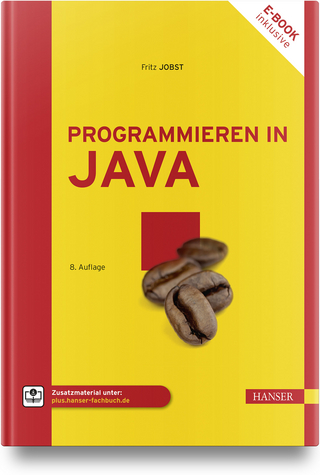
Sams Teach Yourself Java in 24 Hours (Covering Java 7 and Android)
Sams Publishing (Verlag)
978-0-672-33575-4 (ISBN)
- Titel erscheint in neuer Auflage
- Artikel merken
Covering Java 7 and Android Development
In just 24 lessons of one hour or less, you can learn how to create Java applications. Using a straightforward, step-by-step approach, popular author Rogers Cadenhead helps you master the skills and technology you need to create desktop and web programs, web services, and even an Android app in Java.
Full-color figures and clear step-by-step instructions visually show you how to program with Java.
Quizzes and Exercises at the end of each chapter help you test your knowledge.
Notes, Tips, and Cautions provide related information, advice, and warnings.
Learn how to…
Set up your Java programming environment
Write your first working program in just minutes
Control program decisions and behavior
Store and work with information
Build straightforward user interfaces
Create interactive web programs
Use threading to build more responsive programs
Read and write files and XML data
Master best practices for object-oriented programming
Create flexible, interoperable web services with JAX-WS
Use Java to create an Android app
PART I: Getting Started
HOUR 1: Becoming a Programmer
HOUR 2: Writing Your First Program
HOUR 3: Vacationing in Java
HOUR 4: Understanding How Java Programs Work
PART II: Learning the Basics of Programming
HOUR 5: Storing and Changing Information in a Program
HOUR 6: Using Strings to Communicate
HOUR 7: Using Conditional Tests to Make Decisions
HOUR 8: Repeating an Action with Loops
PART III: Working with Information in New Ways
HOUR 9: Storing Information with Arrays
HOUR 10: Creating Your First Object
HOUR 11: Describing What Your Object Is Like
HOUR 12: Making the Most of Existing Objects
PART IV: Programming a Graphical User Interface
HOUR 13: Building a Simple User Interface
HOUR 14: Laying Out a User Interface
HOUR 15: Responding to User Input
HOUR 16: Building a Complex User Interface
PART V: Moving into Advanced Topics
HOUR 17: Creating Interactive Web Programs
HOUR 18: Handling Errors in a Program
HOUR 19: Creating a Threaded Program
HOUR 20: Reading and Writing Files
PART VI: Writing Internet Applications
HOUR 21: Reading and Writing XML Data
HOUR 22: Creating Web Services with JAX-WS
HOUR 23: Creating Java2D Graphics
HOUR 24: Writing Android Apps
PART VII: Appendixes
APPENDIX A: Using the NetBeans Integrated Development Environment
APPENDIX B: Where to Go from Here: Java Resources
APPENDIX C: This Book’s Website
APPENDIX D: Setting Up an Android Development Environment
Rogers Cadenhead is a writer, computer programmer, and web developer who has written more than 20 books on Internet-related topics, including Sams Teach Yourself Java in 21 Days. He maintains the Drudge Retort and other websites that receive more than 20 million visits a year. This book’s official website is at www.java24hours.com.
INTRODUCTION 1
PART I: Getting Started
HOUR 1: Becoming a Programmer
Choosing a Language 4
Telling the Computer What to Do 5
How Programs Work 7
When Programs Don’t Work 8
Choosing a Java Programming Tool 8
Installing a Java Development Tool 9
HOUR 2: Writing Your First Program
What You Need to Write Programs 13
Creating the Saluton Program 14
Beginning the Program 14
Storing Information in a Variable 17
Saving the Finished Product 18
Compiling the Program into a Class File 19
Fixing Errors 19
Running a Java Program 20
HOUR 3: Vacationing in Java
First Stop: Oracle 25
Going to School with Java 27
Lunch in JavaWorld 29
Watching the Skies at NASA 31
Getting Down to Business 32
Stopping by Java Boutique for Directions 33
Running Java on Your Phone 35
HOUR 4: Understanding How Java Programs Work
Creating an Application 39
Sending Arguments to Applications 41
Creating an Applet 42
PART II: Learning the Basics of Programming
HOUR 5: Storing and Changing Information in a Program
Statements and Expressions 49
Assigning Variable Types 50
Naming Your Variables 54
Storing Information in Variables 54
All About Operators 55
Using Expressions 59
HOUR 6: Using Strings to Communicate
Storing Text in Strings 65
Displaying Strings in Programs 66
Using Special Characters in Strings 67
Pasting Strings Together 68
Using Other Variables with Strings 68
Advanced String Handling 70
Presenting Credits 72
HOUR 7: Using Conditional Tests to Make Decisions
if Statements 79
if-else Statements 83
switch Statements 84
The Conditional Operator 86
Watching the Clock 87
HOUR 8: Repeating an Action with Loops
for Loops 95
while Loops 98
do-while Loops 99
Exiting a Loop 100
Naming a Loop 101
Testing Your Computer Speed 102
PART III: Working with Information in New Ways
HOUR 9: Storing Information with Arrays
Creating Arrays 108
Using Arrays 109
Multidimensional Arrays 111
Sorting an Array 111
Counting Characters in Strings 113
HOUR 10: Creating Your First Object
How Object-Oriented Programming Works 121
Objects in Action 122
What Objects Are 124
Understanding Inheritance 125
Building an Inheritance Hierarchy 125
Converting Objects and Simple Variables 127
Creating an Object 132
HOUR 11: Describing What Your Object Is Like
Creating Variables 137
Creating Class Variables 139
Creating Behavior with Methods 140
Putting One Class Inside Another 146
Using the this Keyword 147
Using Class Methods and Variables 148
HOUR 12: Making the Most of Existing Objects
The Power of Inheritance 155
Establishing Inheritance 157
Working with Existing Objects 159
Storing Objects of the Same Class in Vectors 160
Creating a Subclass 164
PART IV: Programming a Graphical User Interface
HOUR 13: Building a Simple User Interface
Swing and the Abstract Windowing Toolkit 169
Using Components 170
Creating Your Own Component 180
HOUR 14: Laying Out a User Interface
Using Layout Managers 187
Laying Out an Application 192
HOUR 15: Responding to User Input
Getting Your Programs to Listen 201
Setting Up Components to Be Heard 202
Handling User Events 202
Completing a Graphical Application 207
HOUR 16: Building a Complex User Interface
Scroll Panes 219
Sliders 222
Change Listeners 223
Using Image Icons and Toolbars 227
PART V: Moving into Advanced Topics
HOUR 17: Creating Interactive Web Programs
Standard Applet Methods 235
Putting an Applet on a Web Page 238
Creating an Applet 239
Sending Parameters from a Web Page 242
Handling Parameters in an Applet 243
Using the Object Tag 245
HOUR 18: Handling Errors in a Program
Exceptions 249
Throwing Exceptions 256
Throwing and Catching Exceptions 258
HOUR 19: Creating a Threaded Program
Threads 265
Working with Threads 270
Starting with init() 272
Catching Errors as You Set Up URLs 272
Handling Screen Updates in the paint() Method 273
Starting the Thread 274
Handling Mouse Clicks 276
Displaying Revolving Links 276
HOUR 20: Reading and Writing Files
Streams 283
Writing Data to a Stream 290
Reading and Writing Configuration Properties 292
PART VI: Writing Internet Applications
HOUR 21: Reading and Writing XML Data
Creating an XML File 299
Reading an XML File 302
Reading RSS Syndication Feeds 307
HOUR 22: Creating Web Services with JAX-WS
Defining a Service Endpoint Interface 313
Creating a Service Implementation Bean 316
Publishing the Web Service 317
Using Web Service Definition Language Files 318
Creating a Web Service Client 320
HOUR 23: Creating Java2D Graphics
Using the Font Class 327
Using the Color Class 328
Creating Custom Colors 329
Drawing Lines and Shapes 329
Baking a Pie Graph 333
HOUR 24: Writing Android Apps
Introduction to Android 343
Creating an Android App 345
Running the App 352
Designing a Real App 355
PART VII: Appendixes
APPENDIX A: Using the NetBeans Integrated Development Environment
Installing NetBeans 373
Creating a New Project 374
Creating a New Java Class 376
Running the Application 378
Fixing Errors 378
APPENDIX B: Where to Go from Here: Java Resources
Other Books to Consider 381
Oracle’s Official Java Site 382
Other Java Websites 383
Job Opportunities 385
APPENDIX C: This Book’s Website 387
APPENDIX D: Setting Up an Android Development Environment
Getting Started 389
Installing Eclipse 390
Installing Android SDK 390
Installing the Android Plug-in for Eclipse 391
Setting Up Your Phone 394
9780672335754 TOC 9/30/2011
| Erscheint lt. Verlag | 9.11.2011 |
|---|---|
| Verlagsort | Indianapolis |
| Sprache | englisch |
| Maße | 191 x 230 mm |
| Gewicht | 712 g |
| Themenwelt | Informatik ► Programmiersprachen / -werkzeuge ► Java |
| Mathematik / Informatik ► Informatik ► Web / Internet | |
| ISBN-10 | 0-672-33575-1 / 0672335751 |
| ISBN-13 | 978-0-672-33575-4 / 9780672335754 |
| Zustand | Neuware |
| Informationen gemäß Produktsicherheitsverordnung (GPSR) | |
| Haben Sie eine Frage zum Produkt? |
aus dem Bereich



